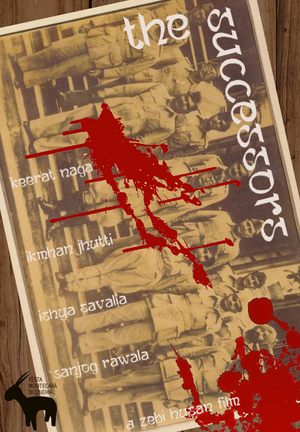The Successors: Difference between revisions
No edit summary |
m (Removing from main Kylaris category) |
||
| Line 40: | Line 40: | ||
==Release== | ==Release== | ||
===Overview=== | ===Overview=== | ||
[[category:Ajahadya]] | [[category:Ajahadya]] | ||
Revision as of 15:41, 28 October 2020
This article is incomplete because it is pending further input from participants, or it is a work-in-progress by one author. Please comment on this article's talk page to share your input, comments and questions. Note: To contribute to this article, you may need to seek help from the author(s) of this page. |
| The Successors Stylised as: the successors Himavantan: Anugāmī'ō અનુગામીઓ Gaullican: les successeurs | |
|---|---|
 Theatrical release poster | |
| Directed by | Zebi Husan |
| Written by | Ikleen Behl |
| Screenplay by | Harman Saroha |
| Produced by | Janav Patel |
| Starring | Keerat Naga Ikmhan Jhutti Ishya Savalia Sanjog Rawala |
| Cinematography | Kul Sivia |
| Edited by | Sadhu Singh |
| Music by | Dharam Mandeer |
Production company | ZH Films |
| Distributed by | Hala Studios |
Release dates |
|
Running time | 107 Minutes |
| Country | Ajahadya |
| Languages | Gaullican Himavantan Estmerish |
The Successors, stylised as the successors (Gaullican: les successeurs, Himavantan: Anugāmī'ō અનુગામીઓ) is a 2020 Ajahadya satiric black comedy, directed by Zebi Husan, written by Ikleen Behl and starring Keerat Naga, Ikmhan Jhutti, Ishya Savalia and Sanjog Rawala. The film depicts the end of the Great War in Ajahadya and the resulting power struggle between various factions leading up to the Ajahadyan Civil War. Depicting the events as a farce, the film has been controversial within Satria, and has been banned in Subarna for its portrayal of Muhammed Jahangir Sarkar, the first president of the country.
The film is notable for featuring large parts spoken in Gaullican, Himavantan and Estmerish, and smaller parts in Etrurian, Togot and Zubadi, making it one of the most multilingual films produced in Ajahadya. When asked for why she chose to structure the film with multiple languages, the director, Zebi Husan, said that "to have everyone speak one language would be to whitewash history. All the figures featured were polyglots, and what languages they did and did not share with one another were significant to how events unfolded according to records and memoirs and the unfolding farce of events. I also appreciated the irony of anti-colonial leaders being forced to use the languages of colonists to communicate in some specific cases."